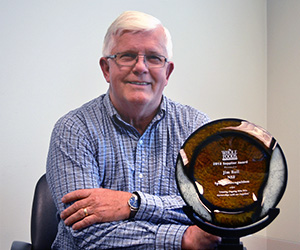Whole Foods Market honors NSF International food safety expert
Customers have a reasonable expectation that food they buy from the grocery store will be safe for them to eat.
It might seem like a simple notion, but there are a number of checks and procedures that have to happen along the food’s supply chain to ensure that it is not contaminated or otherwise dangerous.

NSF International director of supply chain food safety technical services Jim Bail with his award from Whole Foods Market.
Courtesy NFS International
“If you’re working with large multi-national companies, those guys have tons of resources and scientists and food safety experts,” John Burns, Whole Foods’ executive director of global food safety and quality assurance, said.
“But a mom and pop granola operation that’s located within a couple miles of a store and provides incredible products doesn’t have those mechanisms in place.”
To help bring their smaller suppliers up to code, Whole Foods sought out Ann Arbor-based NSF International, a public health organization that helps establish standards for safety in food, water and other consumer goods.
“One day out of the blue I got a cold call from [John] Burns. He had some questions about food safety auditing and that kind of thing,” NSF International director of supply chain food safety technical services Jim Bail said. “That was eight years ago.”
Over nearly a decade, Bail and NSF International have helped Whole Foods develop quality control mechanisms for their regional suppliers. On June 6, Bail was honored by Whole Foods with a newly created “Special Recognition Supplier Award.”
“We started giving suppliers awards a couple of years ago, and we started thinking about our service providers, the ones who partner with us and allow us to provide the caliber of products we want to provide to our customers,” Burns said.
“And the first person that came out of that was Jim and the work he’s done helping us with our supply chains… He’s not just a service provider, he’s helping us to solve the problems we have and the challenges we have in the organic industry.”
Bail said the relationships between he and Burns and the companies they work for have grown naturally over the years thanks to common concerns and ideologies and that the award was an acknowledgement of that connection.
“It was a real honor for me to receive the award. I admire the way Whole Foods goes about their business and we just appreciate the opportunity to work with them,” he said.
“They value innovation and they engage in a lot of fresh thinking. They’re very receptive to that sort of thing and I think that’s one of the reasons it’s been such a great working relationship with them.”
Food safety is not always seen as a realm with a lot of innovation, but Burns noted the same quality when asked to put a finger on what made the company’s relationship with NSF International, and Bail in particular, so unique and fruitful. “He’s a great innovative thinker, someone who truly understands the food industry not just from the big producer prospective but from the smaller and organic prospective as well,” he said.
Ben Freed covers business for AnnArbor.com. You can sign up here to receive Business Review updates every week. Get in touch with Ben at 734-623-2528 or email him at benfreed@annarbor.com. Follow him on twitter @BFreedinA2


Comments
Ann English
Sun, Jun 16, 2013 : 1 a.m.
Jim Bail probably knows about Environmental Working Group, which puts out a shopper's guide to pesticides in produce: the dirty dozen (apples , bell peppers, blueberries, celery, cucumbers, grapes, lettuce, nectarines, peaches, potatoes, spinach and strawberries, plus green beans and kale. The clean fifteen are asparagus, avocado, cabbage, cantaloupe, corn, eggplant, grapefruit, kiwi, mangoes, mushrooms, onions, pineapples, sweet peas, sweet potatoes and watermelon. James Colquhoun and Laurentine ten Bosch, in their book titled Hungry for Change, argue for buying local food. It's less likely to be genetically modified, processed, hydrogenated or homogenized than food shipped in from far away. The ten teachers comprising much of the book's content don't advocate for Whole Foods, but for local farmers' markets.
G. Orwell
Sat, Jun 15, 2013 : 10:46 p.m.
I hope Mr. Bail does not have ties to Monsanto like Obama's Food Safety Czar, Michael Taylor. Michael Taylor is the former lawyer for Monsanto! Talk about the fox guarding the hen house. I will assume Mr. Bail does not have ties to Monsanto since he works for a respectable company like NSF.